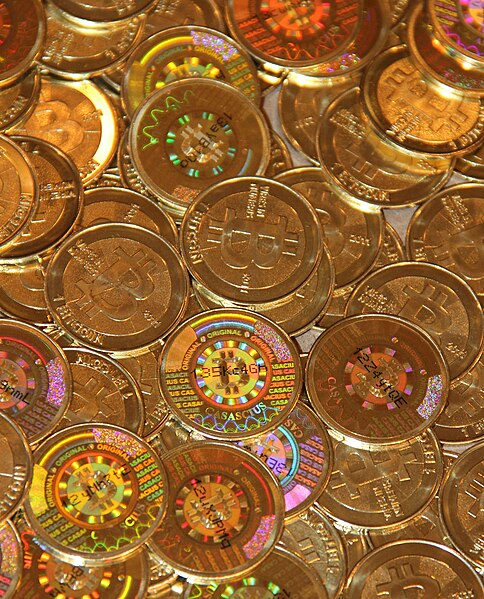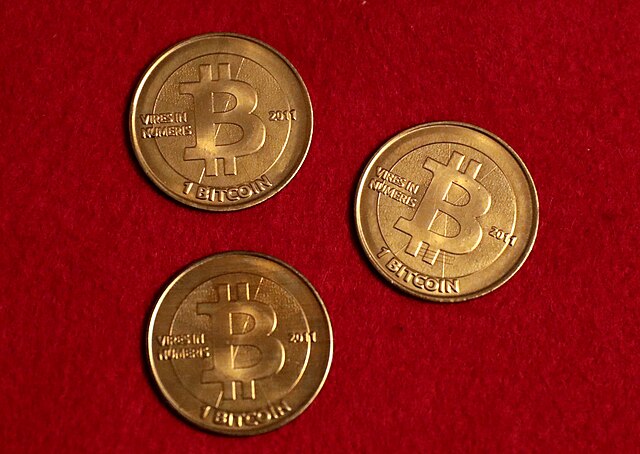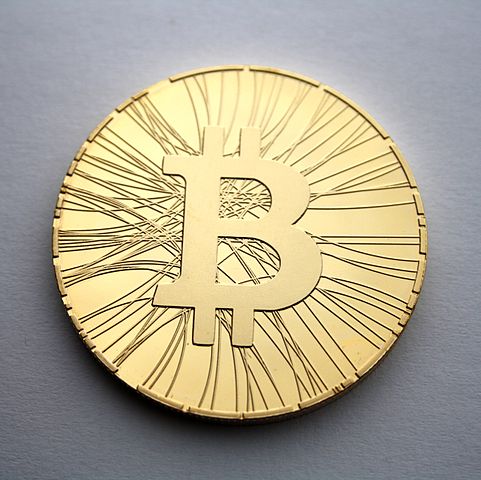
On Friday, 31 January 2020, The German-Southeast Asian Center of Excellence for Public Policy and Good Governance (CPG) will present a special lecture, Driving Legal Innovation in the 21st Century: Bitcoin, Blockchain and You.
Students and other members of the Thammasat University Community who wish to attend are cordially invited to register at this link.
The TU Library owns several books on bitcoin, blockchain, and related subjects.
The lecture will be held from 2pm to 4pm in the Jitti Tingsabadh Room on the ground floor of the Faculty of Law, Thammasat University, Tha Prachan campus, Bangkok.
As TU students know, Bitcoin is a cryptocurrency. A cryptocurrency is a digital asset designed to work as a medium of exchange that uses strong cryptography to secure financial transactions, control the creation of additional units, and verify the transfer of assets. Cryptocurrencies use decentralized control as opposed to centralized digital currency and central banking systems.
Bitcoin can be sent from user to user on the peer-to-peer bitcoin network without the need for intermediaries.
Blockchain was invented by person or persons unknown to serve as the public transaction ledger of the cryptocurrency bitcoin. Blockchains that are readable by the public are widely used by cryptocurrencies. Blockchain is considered a type of payment rail. A payment rail is a payment platform or a payment network that moves money from a payer to a payee. Either party could be a consumer or business, and both parties are able to move funds on the network. Private blockchains have been proposed for business use.
The speaker on 31 January will be Pindar Wong, CoinDesk/Committee of the Innovation, Technology and Re-industrialisation of the Hong Kong Government.
As an online biography explains,
Pindar Wong is an internet pioneer, who co-founded the first licensed Internet Service Provider in Hong Kong in 1993 and the ‘Belt and Road Blockchain’ Consortium in 2017. He is the Chairman of VeriFi (Hong Kong) Ltd, a discrete Internet Financial Infrastructure consultancy. In 2015, he helped organize Asia’s first Blockchainworkshops.org, Phase 1, 2 and 3 of ScalingBitcoin.org and sponsored the Hong Kong Bitcoin Roundtable. He serves on the Advisory Board of Coindesk, Chair of the Internet Society’s Blockchain Special Interest Group. Together with Dr. Shin’ichiro Matsuo, he is establishing the bsafe.network to promote applied academic research in blockchain technologies.
Pindar serves on the Hong Kong Government’s Committee on Innovation, Technology and Re-industrialisation as a Director of the Hong Kong Applied Science and Technology Research Institute (ASTRI) and also serves on the Hong Kong Trade Development Council ICT Services advisory committee, the School of Engineering Advisory Committee HKUST, the Technical Advisory Board of the Packet Clearing House, Editorial Advisory Board of the Internet Protocol Journal, the steering committee of the Digital Asia Hub and HKITC Enterprise Support Scheme Assessment Panel.

The CPG website introduces the presentation in this manner:
Concept note
In 2019, China’s President Xi stated the importance of blockchain technology research in driving national development. Also known as ‘Distributed Ledger Technology’, does it make even sense to take the bitcoin out of blockchain, to have an abacus with no beads, or has using the accounting worldview been a giant mistake — is the real revolution here actually better framed as a legal one: a lex cryptographia ?
Pindar Wong will share his perspectives on what he terms, ‘Rough Justice and Running Code’: on emerging governance and regulatory challenges in decentralized finance enabled by bitcoin, digitized Central Bank Digital Currencies (CBDCs), emerging automated online dispute resolution systems and why a blockchain bill of rights is necessary in a ‘World of Angels’.
Here are some observations on bitcoin and cryptocurrencies:
- I think the internet is going to be one of the major forces for reducing the role of government. The one thing that’s missing but that will soon be developed, is a reliable e-cash.
Professor Milton Friedman, Nobel Prize winner in economics
- [Virtual Currencies] may hold long-term promise, particularly if the innovations promote a faster, more secure and more efficient payment system.
Ben Bernanke, Chairman of the Federal Reserve
- The Federal Reserve simply does not have authority to supervise or regulate bitcoin in any way.
Janet Yellen, Chair of the US Federal Reserve, 27 February 2014
- Stay away from it. It’s a mirage, basically.
Warren Buffet, CEO of Berkshire Hathaway, 14 February 2014
- Bitcoin is evil.
Paul Krugman, Nobel-prize winning economist, 28 December 2013
In 2018, in an article in The New York Times, Krugman further explained his concerns:
Transaction Costs and Tethers: Why I’m a Crypto Skeptic
…Banknotes worked because people knew something about the banks that issued them, and these banks had an incentive to preserve their reputation… But you’re supposed to be sure that a Bitcoin is real without knowing who issued it, so you need the digital equivalent of biting a gold coin to be sure it’s the real deal, and the costs of producing something that satisfies that test have to be high enough to discourage fraud.
In other words, cryptocurrency enthusiasts are effectively celebrating the use of cutting-edge technology to set the monetary system back 300 years. Why would you want to do that? What problem does it solve? I have yet to see a clear answer to that question.
Bear in mind that conventional money generally does its job quite well. Transaction costs are low. The purchasing power of a dollar a year from now is highly predictable – orders of magnitude more predictable than that of a Bitcoin. Using a bank account means trusting a bank, but by and large banks justify that trust, far more so than the firms that hold cryptocurrency tokens. So why change to a form of money that works far less well?
Indeed, eight years after Bitcoin was launched, cryptocurrencies have made very few inroads into actual commerce. A few firms will accept them as payment, but my sense is that this is more about signaling — look at me, I’m cutting-edge! — than about real usefulness. Crypocurrencies have a large market valuation, but they’re overwhelmingly being held as a speculative play, not because they’re useful as mediums of exchange.
Does this mean that crypto is a pure bubble, which will eventually deflate to nothing? It’s worth pointing out that there are other currency-like assets that don’t actually get much use as money, but which people hold anyway. Gold hasn’t been actual money for a very long time, yet it retains its value.
(All images courtesy of Wikimedia Commons)

